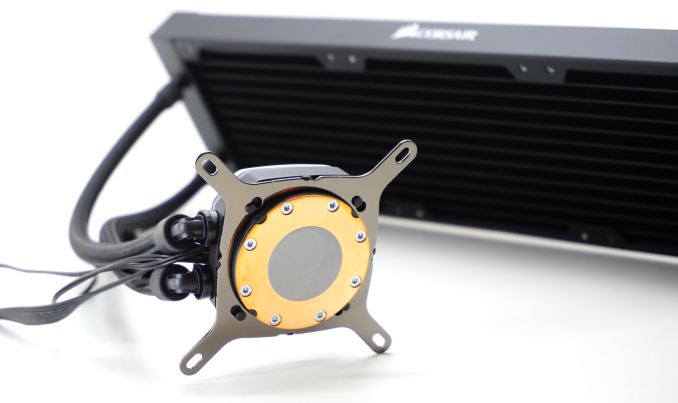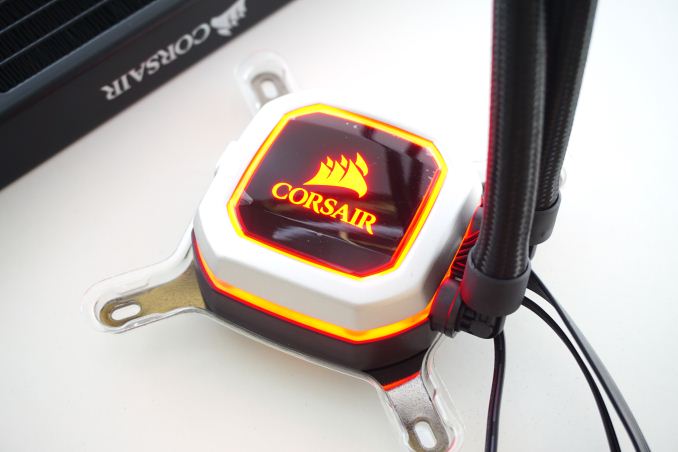The Corsair H150i Pro RGB AIO Cooler Review: The Quiet Giant
by E. Fylladitakis on August 16, 2018 8:00 AM ESTConclusion
In an effort to cover the widest possible segment of the cooling market, Corsair is ever-expanding their popular Hydro cooler series to include new products, each designed to fulfill different wants and needs. The Hydro H150i Pro RGB is the latest addition to the series, with a massive 400 mm long radiator and three 120 mm fans. Despite its monstrous appearance, the H150i Pro RGB is not strictly aimed towards overclockers and advanced enthusiasts but is designed to be simple to install and to offer very low operating noise levels.
In terms of thermal performance, the H150i Pro RGB may initially appear to be mediocre, with the cooler hardly outperforming its significantly smaller predecessors. Although it does perform just a tiny bit better than other AIO cooler products that we have previously tested, it stands no chance against a custom liquid cooling kit with an equally sized radiator. The catch is that a liquid cooling kit is far more complex to install and maintain, plus it costs almost twice as much as the H150i Pro RGB does, all while the thermal performance of the H150i Pro RGB is more than adequate even for heavy overclocking with Intel and AMD Ryzen processors. Therefore, even though the thermal performance of a large kit will be significantly superior, it hardly is a reasonable choice for any user other than those seeking the absolute best and pay no attention to the cost.
The true strength of the H150i Pro RGB lies with its acoustics performance. With the radiator designed to minimize airflow restriction, the H150i Pro RGB performs exceptionally well with low speed fans, allowing it to achieve excellent thermal performance while upholding whisper-quiet sound pressure levels. Note that the H150i Pro RGB is designed for fanless mode operation, meaning that the fans are perfectly capable of stopping entirely when they are not necessary. Operating the H150i Pro RGB in this mode will keep the radiator's fans stopped while any modern processor is idling, as the thermal power output can be easily handled by the liquid flow alone. This will both greatly extend the lifetime of the fans and the comfort levels of the user while performing typical everyday tasks with the system.
We find that the only significant drawback of the Corsair H150i Pro RGB is its retail price. Corsair's MSRP pricing of the H150i Pro RGB is $169.99 but we found the cooler retailing for $160 at the time of this review. The price tag is hefty and will certainly drive users that care about cost-effectiveness away. On the other hand, the Corsair H150i Pro RGB actually is cheaper than most AIO cooling products that have such a large radiator, is of excellent quality, and offers great thermal performance with minimal noise levels. It is the ideal choice for properly cooling processors with very high thermal requirements when low noise levels are desirable and/or necessary.












42 Comments
View All Comments
FireSnake - Thursday, August 16, 2018 - link
Nice review, thanks!Orange14 - Thursday, August 16, 2018 - link
So I can pay over $150 for a liquid cooler that will not out perform top of the line air coolers that are half the price or less. This is the height of madness.mkaibear - Thursday, August 16, 2018 - link
That's not entirely true - there's still a measurable and significant (>10%) difference between this and top end air coolers.Top end air coolers approach 0.1 C/W but this manages 0.07, for example.
It's not worth it to me, I'm happier with a high end air cooler every time - but for those who like running their systems on the edge for whatever reason there is a difference.
qlum - Thursday, August 16, 2018 - link
from what I understand tower coolers can start to rise in resistance when the the load exceeds the capacity of the heatpipes. Until that point they can be fine. They also depend more on the case than aio's.Or at leadt so I heard.
Gasaraki88 - Thursday, August 16, 2018 - link
Really? You got all that from this review?Stuka87 - Thursday, August 16, 2018 - link
In my experience to get a standard heat/sink fan cooler to beat an AIO you have to run them at very high fan speeds which also makes them very loud. Plus the AIO's get the heat out of the case, instead of just pushing it around inside. I switched to an H100i 4 years ago and it has been flawless. You can't hardly hear it running, and keeps my 4.5GHz 4690K plenty cool (In the 40's most of the time). If you are going to come here and make claims, its best to have data to back up what you are saying.Orange14 - Thursday, August 16, 2018 - link
There is alot of data collated over on Overclock.net Most of the issues seen with overheating are a function of inadequate airflow irrespective of whether one uses an AIO or air cooler. Air coolers don't face pump failure with is an issue with AIOs. Large twin fan air coolers run quiet. The one thing AIOs have is that they don't put stress on the MB which is only an issue with shipping computers. For those are DIY builders there should be no difference between AIOs and air coolers if they properly address case airflow.Shlong - Thursday, August 16, 2018 - link
I have an AIO (generic Asetek 120mm) that I purchased 8 years ago in 2011 for an i7 2600K and it's still working fine. I purchased 3 more since then from Corsair, NZXT and haven't had any issues yet. The systems run quietly when fans would usually be noisy at full load and the ambient temperature in the case is lower.Shlong - Thursday, August 16, 2018 - link
7* not 8*Icehawk - Saturday, August 18, 2018 - link
Ditto, have an H80 on a 3770 from 6-7 years ago runs perfectly and silently with a good O/C. Got another one for my 8700 and it’s not quite as silent but better than a tower would be. Cost is the main thing and I can afford the price differential.